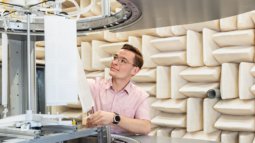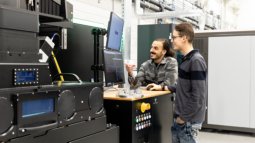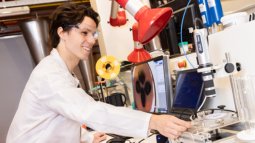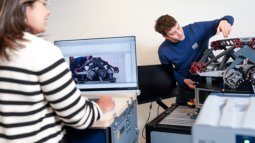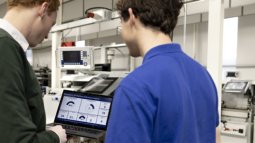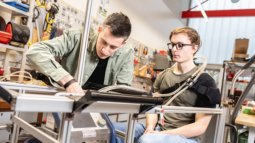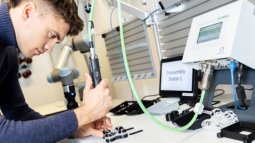Develop specialised skills for innovative and future-ready mechanical solutions.
Energy systems, production machinery, aeroplanes, automobiles, ships, medical devices: many systems and products that are essential to our modern life are in some way a product of mechanical engineering. And the field of mechanical engineering is continuously evolving, especially in today’s world, with the rise of the fourth industrial revolution, technological advancements and a growing urgency for sustainable development. So what does it take to build and optimise renewable energy systems, like wind turbines or heat pumps? What is the potential of smart manufacturing and maintenance technologies, like simulation, 3D printing or sensor technologies? And how can you make smart material choices for the design of aircraft, machine parts or medical equipment? These are just a few of the many versatile questions you might deal with in the Master’s in Mechanical Engineering at the University of Twente.
This Master’s focuses on the design, analysis, and maintenance of machinery, structures, products as well as production processes. It covers the breadth of the field of mechanical engineering, addressing subareas like solid and fluid mechanics, materials science, control and robotics, design, manufacturing techniques, tribology, biomechanics, and more. Whichever subarea(s) you will focus on is completely up to you. Thanks to the diversity of specialisations that you can choose from, you can develop your own expertise in one (or more) of the various subdisciplines within mechanical engineering. In the end, you'll be able to apply your skills to a wide range of systems and products, including renewable energy installations, medical devices, automobiles, and high-tech equipment such as machinery used in computer chip production.
Choose a specialisation
You have a lot of freedom to tailor your Master’s in Mechanical Engineering to your interests and ambitions. You will build your own expertise within one of the seven specialisations, which represent different domains of mechanical engineering. You can choose one of the following specialisations:
Aeronautics
This specialisation makes you an expert in innovations for i.e. aviation, maritime, wind turbines and cars, where aerodynamics interacts with acoustics, structures and propulsion.
2 yearsFull-time
Design & Manufacturing
In this specialisation, you will gain a better understanding of design and production processes and manufacturing facilities as a whole, by focusing on their methodological design.
2 yearsFull-time
Energy & Flow
Do you want to contribute to the development of sustainable energy systems, processes, and equipment that work well and have minimal impact on the environment? Then this is the specialisation for you.
2 yearsFull-time
High-Tech Systems & Materials
You learn to understand the behaviour of materials and systems in order to optimise the performance of things like machines and wind turbines, by making sure all parts work together effectively.
2 yearsFull-time
Maintenance Engineering & Operations
This specialisation will help you to come up with innovative solutions to improve the maintenance of machinery, structures and production facilities, to enhance performance of a system and company.
2 yearsFull-timeEnglish-taught
Personalised Health Technology
Do you want to build expertise in the domain of healthcare technology as a mechanical engineer? Then this specialisation is right for you.
2 yearsFull-time
Smart & Sustainable Industry
This specialisation focuses on the development, analysis, simulation and control of innovative and digitally-driven production systems.
2 yearsFull-time
Career perspectives
Technological advancements, environmental challenges and a lack of (technical) personnel have pushed the demand for mechanical engineers in the labour market. That is why you can look forward to great career prospects. The majority of graduates of this Master’s has a job soon after graduation. Many of them even get a job offer before graduating, for example by the company they are performing their thesis at.
Job opportunities for Mechanical Engineers
As a mechanical engineer, you can pursue a career in a wide variety of sectors, from the manufacturing, energy, transport, aeronautics, automotive, consumer goods and the maritime industry to the biomedical field. Wherever your interests lie, this Master’s prepares you for a broad range of engineering positions such as manufacturing engineer, product developer, maintenance engineer, materials scientist, system engineer, or process manager, to name a few examples. You might join the R&D department of an industrial company, or you could pursue a career in consultancy or research. You can, for example, also continue with a PhD or EngD programme after graduation, as offered by UT’s Twente Graduate School (TGS).
Related programmes
Below you find a list of educational programmes which are (closely) related to Mechanical Engineering.
Engineering & Technology
Applied Mathematics
Expand your understanding of mathematics to tackle challenging issues in a variety of sectors. This Master’s teaches you to discover new patterns and predict them through mathematical models.
Applied Physics
Deepen your understanding of the laws of physics to find technical solutions in a wide range of areas such as IT, sustainability, healthcare, chiptechnology, digitalisation, finance, space and more.
Biomedical Engineering
Technological advances are at the heart of innovation in healthcare. In this Master's, you'll learn to develop medical innovations that contribute to better care, from organ-on-a-chip to exoskeleton.
Business Information Technology
Become an expert in IT-based business innovation, able to devise new services and radically improve the way businesses work.
Chemical Science & Engineering
Develop new chemical processes, materials and molecules and contribute to innovations that benefit our society in areas such as health, water, food and sustainability.
Civil Engineering & Management
Do you want to work on future-proof solutions in the construction, water and/or transport sector? Learn to manage civil engineering projects with an eye for both technical and non-technical aspects.
Computer Science
Become an expert computer scientist and learn to solve the biggest challenges of our digital society by designing and developing more secure and efficient ICT systems.
Construction Management & Engineering
Become an expert in managing large-scale, complex construction projects in an increasingly digitised industry, using an innovative, integral approach.
Electrical Engineering
Design smart and sustainable electronics and advanced chips for applications such as biomedical technology, autonomous vehicles, computer vision, nanotechnology and the energy transition.
Embedded Systems
Become an expert in designing the software and hardware of complex embedded systems in vehicles, pacemakers and chipsets, amongst others.
Humanitarian Engineering
Do you want to tackle complex humanitarian crises worldwide? This Master’s helps you develop sustainable, socio-technological solutions to challenges faced by underserved and marginalised communities.
Industrial Design Engineering
Do you want to design innovative products that improve daily life and address today’s challenges? In this Master’s, you combine design and engineering to enhance both products and product development.
Industrial Engineering & Management
Combine technical expertise with management skills to analyse, improve, and future-proof complex business processes in (international) organisations.
Interaction Technology
Delve into the field of human-computer interaction and design and develop intelligent and interactive technologies that are meaningful to people and society.
Nanotechnology
Tackle big challenges on the tiniest scale: become an expert in nanotechnology and develop smart, innovative solutions for major societal issues in healthcare, ICT and sustainability.
Philosophy of Science, Technology & Society
How does technology shape our lives and the world we live in? Learn to understand the role of modern technology in our society from a philosophical perspective.
Robotics
Become an expert in robotics: design smart, human-centred robots and combine AI, mechatronics, systems integration and ethics to make a real impact in industry and society.
Spatial Systems & Society
Natural disasters, poverty, food shortages, epidemics, and climate change: learn to tackle society’s complex challenges through urban design, urban planning, socio-economics insight and spatial data.
Sustainable Energy Technology
Work towards the energy transition! In this Master's, you will learn to conceive, develop and apply sustainable energy solutions for a future without fossil fuels.
Technical Medicine
This Dutch-taught Master's equips you to use AI, medical imaging and smart sensors to improve diagnoses, personalise treatments and safely apply technology in clinical practice.


